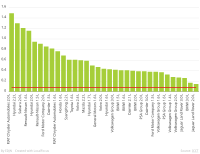
Photo from wikipedia
Current research on eco-driving has focused on solving an optimal control problem (OCP) to generate a speed profile to be tracked by drivers. The optimization variables are often chosen as… Click to show full abstract
Current research on eco-driving has focused on solving an optimal control problem (OCP) to generate a speed profile to be tracked by drivers. The optimization variables are often chosen as low level control actions such as engine torque and gear positions, which leads to complex mixed-integer problems. In this brief, we propose an eco-driving assistance system (EDAS) to improve current EDAS in two aspects. First, an adviser with simplified dynamical model is designed using model predictive control (MPC) to provide not only a speed profile but also real-time high level driving mode advice such as cruising and coasting. Second, drivers’ reaction delay to follow the driving mode advice is explicitly compensated, which mitigates the effect of such delay on fuel savings. The time delay is converted to a spatial parameter in the MPC to provide driving advice in advance. To demonstrate the efficiency and effectiveness of the proposed EDAS, a numerical study and a simulation using measured data from a real-life driving test is conducted. Comparisons are made between the proposed EDAS and an eco-driving controller considering both high and low level control inputs without driver’s reaction delay.
Journal Title: IEEE Transactions on Circuits and Systems II: Express Briefs
Year Published: 2022
Link to full text (if available)
Share on Social Media: Sign Up to like & get
recommendations!